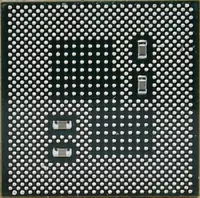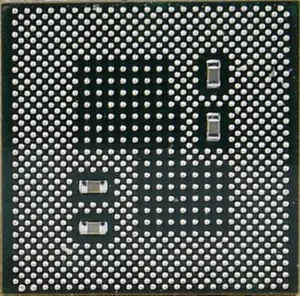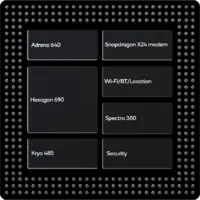(→Utilizing devices) |
(fixed ;) |
||
| (27 intermediate revisions by 18 users not shown) | |||
| Line 1: | Line 1: | ||
| − | {{qualcomm title|Snapdragon 855 | + | {{qualcomm title|Snapdragon 855+}} |
{{chip | {{chip | ||
| − | |name=Snapdragon 855 | + | |name=Snapdragon 855+ |
|no image=Yes | |no image=Yes | ||
|back image=sd 855 (back).png | |back image=sd 855 (back).png | ||
| Line 13: | Line 13: | ||
|first launched=Q3, 2019 | |first launched=Q3, 2019 | ||
|family=Snapdragon 800 | |family=Snapdragon 800 | ||
| + | |family 2=Snapdragon 8 | ||
|series=800 | |series=800 | ||
| − | |frequency=1 | + | |frequency=1.8 GHz |
| − | |frequency 2=2 | + | |frequency 2=2.42 GHz |
| − | |frequency 3=2 | + | |frequency 3=2.96 GHz |
|isa=ARMv8 | |isa=ARMv8 | ||
|isa family=ARM | |isa family=ARM | ||
| − | |microarch=Cortex- | + | |microarch=Cortex-A55 |
| − | |microarch 2=Cortex- | + | |microarch 2=Cortex-A76 |
| − | |core name=Kryo 485 Gold | + | |core name=Kryo 485 Silver |
| − | |core name | + | |core name 2=Kryo 485 Gold |
| + | |core name 3=Kryo 485 Prime | ||
|process=7 nm | |process=7 nm | ||
| + | |transistors=6,700,000,000 | ||
|technology=CMOS | |technology=CMOS | ||
|die area=73.27 mm² | |die area=73.27 mm² | ||
| Line 31: | Line 34: | ||
|core count=8 | |core count=8 | ||
|thread count=8 | |thread count=8 | ||
| + | |max memory=16 GiB | ||
|max cpus=1 | |max cpus=1 | ||
| − | |||
|predecessor=Snapdragon 845 | |predecessor=Snapdragon 845 | ||
|predecessor link=qualcomm/snapdragon 800/845 | |predecessor link=qualcomm/snapdragon 800/845 | ||
| + | |predecessor 2=Snapdragon 850 | ||
| + | |predecessor 2 link=qualcomm/snapdragon 800/850 | ||
| + | |successor=Snapdragon 865 | ||
| + | |successor link=qualcomm/snapdragon_800/865 | ||
| + | |successor 2=Snapdragon 8cx | ||
| + | |successor 2 link=qualcomm/snapdragon_800/8cx | ||
|contemporary=Snapdragon 855 | |contemporary=Snapdragon 855 | ||
|contemporary link=qualcomm/snapdragon_800/855 | |contemporary link=qualcomm/snapdragon_800/855 | ||
| + | |contemporary 2=Snapdragon 860 | ||
| + | |contemporary 2 link=qualcomm/snapdragon_800/855 plus#Overview | ||
}} | }} | ||
| − | [[File:snapdragon-855-block-diagram.png|thumb|right|Block Diagram|200px]] | + | <!-- [[File:snapdragon-855-block-diagram.png|thumb|right|Block Diagram|200px]] --> |
| − | '''Snapdragon 855 | + | '''Snapdragon 855+''' ('''855 Plus''') is a high-performance {{arch|64}} [[ARM]] [[LTE]] [[system on a chip]] designed by [[Qualcomm]] and introduced in mid [[2019]]. |
| + | |||
| + | Fabricated on TSMC's [[N7|7nm process]], the 855+ features four [[Kryo 485 Silver]] high-efficiency cores operating at 1.8 GHz along with three high-performance [[Kryo 485 Gold]] operating at 2.42 GHz and another higher-performance [[Kryo 485 Prime]] core operating at 2.96 GHz. | ||
| + | |||
| + | The Snapdragon 855+ integrates the {{qualcomm|Adreno 640}} [[GPU]] operation at 700 MHz and features an X24 LTE modem supporting Cat 20 uplink and Cat 20 downlink. This chip supports up to 16 GiB of quad-channel LPDDR4X-4266 memory. | ||
| + | |||
| + | {{see also|Qualcomm|Snapdragon 8}} | ||
| + | |||
| + | == Overview == | ||
| + | [[File:snapdragon-855-block-diagram.png|thumb|left|Block Diagram|200px]] | ||
| − | The Snapdragon 855+ can be paired with Qualcomm's X50 5G modem (an external chip) and an RF front-end interface chip ( | + | The Snapdragon 855+ can be paired with [[Qualcomm]]'s X50 5G modem (an external chip) and an RF front-end interface chip (RF FEM) to bring 5G NR, sub-6 GHz and mmWave, support. |
| − | The 855+ is identical to the {{\\|855}} but features slightly higher GPU and CPU frequencies. | + | *The '''855+''' (SM8150-AC) is identical to the '''{{\\|855}}''' but features slightly higher GPU and CPU frequencies. |
| + | *The '''860''' (SM8150-AD) is identical to the {{\\|855 plus}}, it is a pure rebranding of the 855+. | ||
== Cache == | == Cache == | ||
| Line 141: | Line 162: | ||
== Camera == | == Camera == | ||
* ISP | * ISP | ||
| − | ** Qualcomm Spectra 380 image signal processor | + | ** [[Qualcomm]] Spectra 380 image signal processor |
*** Dual 14-bit CV-ISPs | *** Dual 14-bit CV-ISPs | ||
*** Hardware accelerator for computer vision (CV-ISP) | *** Hardware accelerator for computer vision (CV-ISP) | ||
| Line 183: | Line 204: | ||
== Utilizing devices == | == Utilizing devices == | ||
| − | * [[used by:: | + | {{lbox |
| + | |'''Models''' | ||
| + | | | ||
| + | {{collist | ||
| + | | count = 4 | ||
| + | | | ||
| + | * [[used by::Asus ROG Phone II]] | ||
| + | * [[used by::Black Shark 2 Pro]] | ||
| + | * [[used by::Meizu 16s Pro]] | ||
| + | * [[used by::Oppo Reno Ace]] | ||
| + | * [[used by::OnePlus 7T]] | ||
| + | * [[used by::OnePlus 7T Pro]] | ||
| + | * [[used by::Realme X2 Pro]] | ||
| + | * [[used by::Realme X3]] | ||
| + | |||
| + | * [[used by::Realme X3 SuperZoom]] | ||
| + | * [[used by::Redmi K20 Pro (Premium)]] | ||
| + | * [[used by::Samsung Galaxy Z Flip]] | ||
| + | * [[used by::Samsung Galaxy Tab S6 5G]] | ||
| + | * [[used by::Samsung Galaxy Quantum 2]] | ||
| + | * [[used by::Samsung Galaxy A82 5G]] | ||
| + | * [[used by::Samsung W20 5G]] | ||
| + | * [[used by::Smartisan Pro 3]] | ||
| + | |||
| + | * [[used by::Vivo iQOO Neo 855 Racing]] | ||
| + | * [[used by::Vivo iQOO Pro]] (4G/5G) | ||
| + | * [[used by::Vivo NEX 3]] (4G/5G) | ||
| + | * [[used by::Xiaomi Mix Alpha]] | ||
| + | * [[used by::Xiaomi Mi 9 Pro]] (5G) | ||
| + | * [[used by::Xiaomi Poco X3 Pro]] (860) | ||
| + | * [[used by::ZTE Nubia Red Magic 3s]] | ||
| + | * [[used by::ZTE Nubia Z20]] <!-- | ||
| + | * [[used by::Xiaomi Pad 5]] (Snapdragon 860) | ||
| + | * [[used by::Xiaomi Poco X3 Pro]] (Snapdragon 860) --> | ||
| + | }} | ||
{{expand list}} | {{expand list}} | ||
| + | }} | ||
| + | <!-- | ||
| + | SM8150-AC (855+) Q3 2019 | ||
| + | :ASUS ROG Phone II, Black Shark 2 Pro, Vivo iQOO Pro (4G/5G), iQOO Neo 855 Racing | ||
| + | :Meizu 16s Pro • Oppo Reno Ace, Nubia Red Magic 3s, Nubia Z20 | ||
| + | :OnePlus 7T, OnePlus 7T Pro (4G/5G), Realme X2 Pro, Realme X3, Realme X3 SuperZoom | ||
| + | :Redmi K20 Pro (Premium Edition) | ||
| + | :Samsung Galaxy A82 5G, Samsung Galaxy Z Flip, Samsung W20 5G | ||
| + | :Samsung Galaxy Quantum2 (Galaxy A82 5G in South Korea), | ||
| + | :Smartisan Pro 3, Vivo NEX 3 (4G/5G), Xiaomi Mi 9 Pro | ||
| + | SM8150-AD (860) Q1 2021 | ||
| + | :Poco X3 Pro, Xiaomi Pad 5 | ||
| + | --> | ||
== Documents == | == Documents == | ||
* [[:File:855p-pb.pdf|Product Brief]] | * [[:File:855p-pb.pdf|Product Brief]] | ||
* [[:File:snapdragon-855-entertainment-deep-dive-hiren-bhinde.pdf|Entertainment Deep Dive Presentation]] | * [[:File:snapdragon-855-entertainment-deep-dive-hiren-bhinde.pdf|Entertainment Deep Dive Presentation]] | ||
* [[:File:snapdragon-855-deep-dives-intro-keith-kressin.pdf|Deep Dive Presentation]] | * [[:File:snapdragon-855-deep-dives-intro-keith-kressin.pdf|Deep Dive Presentation]] | ||
Latest revision as of 21:11, 23 February 2025
| Edit Values | |
| Snapdragon 855+ | |
| General Info | |
| Designer | Qualcomm, ARM Holdings |
| Manufacturer | TSMC |
| Model Number | SDM855AC |
| Part Number | SM8150-AC |
| Market | Mobile |
| Introduction | July 15, 2019 (announced) Q3, 2019 (launched) |
| General Specs | |
| Family | Snapdragon 800, Snapdragon 8 |
| Series | 800 |
| Frequency | 1.8 GHz, 2.42 GHz, 2.96 GHz |
| Microarchitecture | |
| ISA | ARMv8 (ARM) |
| Microarchitecture | Cortex-A55, Cortex-A76 |
| Core Name | Kryo 485 Silver, Kryo 485 Gold, Kryo 485 Prime |
| Process | 7 nm |
| Transistors | 6,700,000,000 |
| Technology | CMOS |
| Die | 73.27 mm² 8.48 mm × 8.64 mm |
| Word Size | 64 bit |
| Cores | 8 |
| Threads | 8 |
| Max Memory | 16 GiB |
| Multiprocessing | |
| Max SMP | 1-Way (Uniprocessor) |
| Packaging | |
 | |
| Succession | |
| Contemporary | |
| Snapdragon 855 Snapdragon 860 | |
Snapdragon 855+ (855 Plus) is a high-performance 64-bit ARM LTE system on a chip designed by Qualcomm and introduced in mid 2019.
Fabricated on TSMC's 7nm process, the 855+ features four Kryo 485 Silver high-efficiency cores operating at 1.8 GHz along with three high-performance Kryo 485 Gold operating at 2.42 GHz and another higher-performance Kryo 485 Prime core operating at 2.96 GHz.
The Snapdragon 855+ integrates the Adreno 640 GPU operation at 700 MHz and features an X24 LTE modem supporting Cat 20 uplink and Cat 20 downlink. This chip supports up to 16 GiB of quad-channel LPDDR4X-4266 memory.
- See also: Qualcomm and Snapdragon 8
Contents
Overview[edit]
The Snapdragon 855+ can be paired with Qualcomm's X50 5G modem (an external chip) and an RF front-end interface chip (RF FEM) to bring 5G NR, sub-6 GHz and mmWave, support.
- The 855+ (SM8150-AC) is identical to the 855 but features slightly higher GPU and CPU frequencies.
- The 860 (SM8150-AD) is identical to the 855 plus, it is a pure rebranding of the 855+.
Cache[edit]
- Main articles: Cortex-A76 § Cache and Cortex-A55 § Cache
1+3 core cluster Cortex-A76:
|
Cache Organization
Cache is a hardware component containing a relatively small and extremely fast memory designed to speed up the performance of a CPU by preparing ahead of time the data it needs to read from a relatively slower medium such as main memory. The organization and amount of cache can have a large impact on the performance, power consumption, die size, and consequently cost of the IC. Cache is specified by its size, number of sets, associativity, block size, sub-block size, and fetch and write-back policies. Note: All units are in kibibytes and mebibytes. |
|||||||||||||||||||||||||
|
|||||||||||||||||||||||||
Quad-core cluster Cortex-A55:
|
Cache Organization
Cache is a hardware component containing a relatively small and extremely fast memory designed to speed up the performance of a CPU by preparing ahead of time the data it needs to read from a relatively slower medium such as main memory. The organization and amount of cache can have a large impact on the performance, power consumption, die size, and consequently cost of the IC. Cache is specified by its size, number of sets, associativity, block size, sub-block size, and fetch and write-back policies. Note: All units are in kibibytes and mebibytes. |
|||||||||||||||||||||||||
|
|||||||||||||||||||||||||
- 2 MiB L3
Memory controller[edit]
|
Integrated Memory Controller
|
||||||||||||||||||
|
||||||||||||||||||
DSP[edit]
This chip features Qualcomm's Hexagon 685 DSP.
Graphics[edit]
|
Integrated Graphics Information
|
||||||||||||||||||||||||||||
|
||||||||||||||||||||||||||||
- Codec: H.265 (HEVC), H.264 (AVC), HDR10, HDR10+, HLG, VP8, VP9
- HDR Playback Codec support for HDR10+, HDR10, HLG and Dolby Vision
- Volumetric VR video playback
- 8K 360 VR video playback
Camera[edit]
- ISP
- Qualcomm Spectra 380 image signal processor
- Dual 14-bit CV-ISPs
- Hardware accelerator for computer vision (CV-ISP)
- Up to 20 MP dual camera
- Up to 48 MP single camera
- Qualcomm Spectra 380 image signal processor
- Photo Capture: HEIF photo capture
- Video Capture:
- Rec. 2020 color gamut video capture
- Up to 10-bit color depth video capture
- Slow motion video capture up to 720p at 480fps,HEVC Video Capture
Connectivity[edit]
- X24 LTE modem
- LTE Category 20
- Downlink:
- 2 Gbps peak
- 7x20 MHz carrier aggregation
- Up to 256-QAM
- Up to 4x4 MIMO on five carriers
- Full-Dimension MIMO (FD-MIMO)
- Maximum 20 spatial streams
- Uplink:
- 316 Mbps peak
- 3x20 MHz carrier aggregation
- Up to 2x 106Mbps LTE streams
- Up to 256-QAM
- Uplink data compression
- LTE FDD, LTE TDD including CBRS support, LAA, LTE Broadcast, WCDMA (DB-DC-HSDPA, DC-HSUPA), TD-SCDMA, CDMA 1x, EV-DO, GSM/EDGE
- WiFi
- Standards: 802.11ax, 802.11ac Wave 2, 802.11a/b/g, 802.11n
- Spectral Bands: 2.4 GHz, 5 GHz, 6 GHz
- Bluetooth
- Bluetooth 5.0
- 2 Mbps
Location[edit]
- Systems: GPS, GLONASS, Beidou, Galileo, QZSS, SBAS, Dual frequency GNSS
Utilizing devices[edit]
- Asus ROG Phone II
- Black Shark 2 Pro
- Meizu 16s Pro
- Oppo Reno Ace
- OnePlus 7T
- OnePlus 7T Pro
- Realme X2 Pro
- Realme X3
- Realme X3 SuperZoom
- Redmi K20 Pro (Premium)
- Samsung Galaxy Z Flip
- Samsung Galaxy Tab S6 5G
- Samsung Galaxy Quantum 2
- Samsung Galaxy A82 5G
- Samsung W20 5G
- Smartisan Pro 3
- Vivo iQOO Neo 855 Racing
- Vivo iQOO Pro (4G/5G)
- Vivo NEX 3 (4G/5G)
- Xiaomi Mix Alpha
- Xiaomi Mi 9 Pro (5G)
- Xiaomi Poco X3 Pro (860)
- ZTE Nubia Red Magic 3s
- ZTE Nubia Z20
This list is incomplete; you can help by expanding it.
Documents[edit]
- all microprocessor models
- microprocessor models by qualcomm
- microprocessor models by qualcomm based on cortex-a55
- microprocessor models by qualcomm based on cortex-a76
- microprocessor models by arm holdings
- microprocessor models by arm holdings based on cortex-a55
- microprocessor models by arm holdings based on cortex-a76
- microprocessor models by tsmc
| back image |  + + |
| base frequency | 1,800 MHz (1.8 GHz, 1,800,000 kHz) +, 2,420 MHz (2.42 GHz, 2,420,000 kHz) + and 2,960 MHz (2.96 GHz, 2,960,000 kHz) + |
| core count | 8 + |
| core name | Kryo 485 Silver +, Kryo 485 Gold + and Kryo 485 Prime + |
| designer | Qualcomm + and ARM Holdings + |
| die area | 73.27 mm² (0.114 in², 0.733 cm², 73,270,000 µm²) + |
| die length | 8.48 mm (0.848 cm, 0.334 in, 8,480 µm) + |
| die width | 8.64 mm (0.864 cm, 0.34 in, 8,640 µm) + |
| dsp | Hexagon 690 DSP + |
| family | Snapdragon 800 + and Snapdragon 8 + |
| first announced | July 15, 2019 + |
| first launched | March 2019 + |
| full page name | qualcomm/snapdragon 800/855 plus + |
| has ecc memory support | false + |
| instance of | microprocessor + |
| integrated gpu | Adreno 640 GPU + |
| integrated gpu base frequency | 250 MHz (0.25 GHz, 250,000 KHz) + |
| integrated gpu designer | Qualcomm + |
| integrated gpu max frequency | 700 MHz (0.7 GHz, 700,000 KHz) + |
| isa | ARMv8 + |
| isa family | ARM + |
| l1$ size | 512 KiB (524,288 B, 0.5 MiB) + |
| l1d$ description | 4-way set associative + |
| l1d$ size | 256 KiB (262,144 B, 0.25 MiB) + |
| l1i$ description | 4-way set associative + and 2-way set associative + |
| l1i$ size | 256 KiB (262,144 B, 0.25 MiB) + |
| l2$ description | 8-way set associative + |
| l2$ size | 1 MiB (1,024 KiB, 1,048,576 B, 9.765625e-4 GiB) + and 0.5 MiB (512 KiB, 524,288 B, 4.882812e-4 GiB) + |
| ldate | March 2019 + |
| manufacturer | TSMC + |
| market segment | Mobile + |
| max cpu count | 1 + |
| max memory | 16,384 MiB (16,777,216 KiB, 17,179,869,184 B, 16 GiB, 0.0156 TiB) + |
| max memory bandwidth | 31.79 GiB/s (32,552.96 MiB/s, 34.134 GB/s, 34,134.253 MB/s, 0.031 TiB/s, 0.0341 TB/s) + |
| max memory channels | 8 + |
| microarchitecture | Cortex-A55 + and Cortex-A76 + |
| model number | SDM855AC + |
| name | Snapdragon 855+ + |
| part number | SM8150-AC + |
| process | 7 nm (0.007 μm, 7.0e-6 mm) + |
| series | 800 + |
| smp max ways | 1 + |
| supported memory type | LPDDR4X-4266 + |
| technology | CMOS + |
| thread count | 8 + |
| transistor count | 6,700,000,000 + |
| used by | Asus ROG Phone II +, Black Shark 2 Pro +, Meizu 16s Pro +, Oppo Reno Ace +, OnePlus 7T +, OnePlus 7T Pro +, Realme X2 Pro +, Realme X3 +, Realme X3 SuperZoom +, Redmi K20 Pro (Premium) +, Samsung Galaxy Z Flip +, Samsung Galaxy Tab S6 5G +, Samsung Galaxy Quantum 2 +, Samsung Galaxy A82 5G +, Samsung W20 5G +, Smartisan Pro 3 +, Vivo iQOO Neo 855 Racing +, Vivo iQOO Pro +, Vivo NEX 3 +, Xiaomi Mix Alpha +, Xiaomi Mi 9 Pro +, Xiaomi Poco X3 Pro +, ZTE Nubia Red Magic 3s + and ZTE Nubia Z20 + |
| word size | 64 bit (8 octets, 16 nibbles) + |
